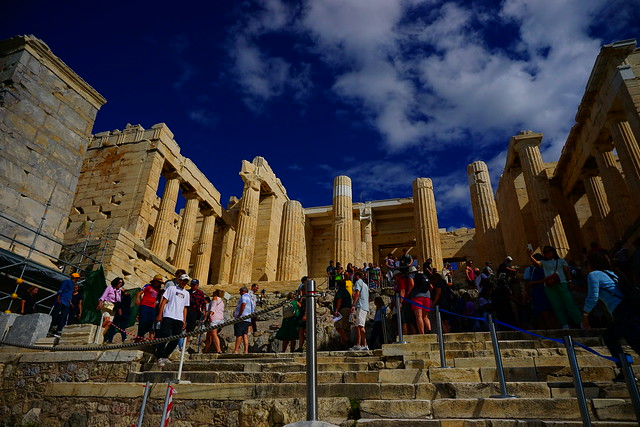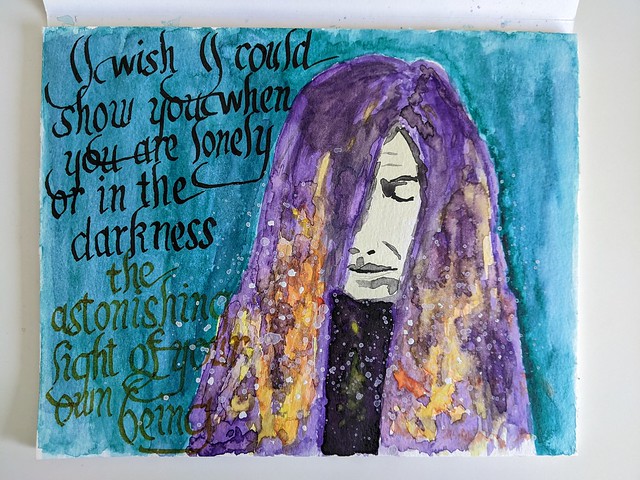Adrift and without a schedule to really stick to, I wandered through the streets of Brera, Milan. In the past few years I have made a tradition out of spending Easter in Italy. This year, I found myself rather aimless and, for the first time, really just ticking cities off a list.
I was looking for an astronomical museum, aiming to reconnect with a past life. After detours and distractions, I found myself in a university, reminiscent of the one I attended three hundred lifetimes ago. It turned out the astronomical museum is not open around Easter—my plans to pass the time were dead before they could get even started. But that’s travel; you have to be flexible.
Instead, I found myself seated inside a moving art installation engulfed in the sound of literature read softly. As the sculpture rotated in its own solemn rhythm, you could, almost, see everything in the midst of the busy bustle of students and staff, tourists and travelers. Time, in dreams, is frozen, or so they say. And I was left to wonder just when—or where—the boundaries between dreams and my waking life blurred.

It was while seated here that my mind opened up and the words came. I have been trying to write a poem for the past few months with nothing really to show for it other than scraps of embarrassing drafts. I had a high-level idea of what I want the poem to be, how it would work, but ideas are not art until realized.
One cold December night, in the busy scramble of last year, I thought I had the words but I forgot them like a dream evaporating from the first rays of daylight.
But I did not feel the need to rush and write down the words as they came to me in Brera. The past few years, I have come to learn how to kill my babies, figuratively speaking. If you make one good piece for every ten attempts, the only way to be prolific is to keep attempting, get the bad out of your system so you can get to the decent much quicker.
These words are not precious if I could not still remember them by this evening, hopefully in my hotel, where they will be written down for the first time.
Fortunately, they came to be. There is at least one person in the world who found the formulation strong enough that he cannot forget them; they were worth remembering at least a bit more longer. And now he’s sharing those words, without further ado.
Shadows in Summer Skies
I drown
in a paradoxical sea of binaries,
of contradictions mutually defining each other,
of contrasts defining form.
Light and dark.
Plus and minus.
You and me.
(We are drowning
in a paradoxical sea of binaries,
whether you know it or not!)
The words have been drained
from this pen,
from my hands,
from the soul;
these are the last ones
and yet they fail my goal
to deify and sanctify
the very air you breathe
the very space you take
the very…you.
I drown
in waters uncharted.
I guess I am afraid,
that when all the words have been said
when all the praises have been sung
all the hallowed verses immortalized
I will find
inside
Merely you.
Beautiful. Still. As you are.
And yet, mortal.
Not an emanation of the Divine.
Not the ethereal resonance of the celestial choir.
From a whole divided,
Comes forth identities multiplied.
From the darkest night,
Breaks forth the dawn.
The Beauty Surrounds.
And yet all I have to remember your presence
is that sacred and terrible air of your absence.
Well, what else can I say? Over the years I have come to appreciate art for the abstraction with which it delivers messages. As such, I am not really inclined towards over-explaining my art. There is a message, yes, but much of it will be left as an exercise to the reader. No, there is no solution key either.
(How terribly author-is-dead postmodern of me. But I will leave my complicated thoughts on postmodernism for another time. Perhaps.)
This much I will say about this: I have been very deliberate about the form and the words. It doesn’t mean there will be no wrong interpretations; it just means my message, once decoded properly (for some definition of the word “properly”), will be very strongly supported by the poem. Who is it for, what is it for, etc.
I like the intrigue. My greatest achievement in this mortal plane will be to buy a decommissioned lighthouse that I will reside in. My greatest achievement from the planes beyond would be if people (hi Academia) analyze the bunch of writings and journals that I will leave behind, reading between every damn line, distinguishing the purposeful puns from the accidental, maybe subconscious, wordplay. I like to think that from my artifacts, it is possible to reverse-engineer the unwritten rules of my work, my life. You’ll chase a bunch of red herrings, finding patterns where none exist. It will be glorious. It will be crazy. Okay, mostly crazy. It will spawn at least a couple dozen professorial chairs, maybe in my Alma Mater if not elsewhere. You are welcome, intellectuals, I just gave a handful of you in the future purpose in life.
Okay. That’s a looooonnnngggg shot. But in our consumerist capitalist society, dreams remain free. I’ll leave that in.
Another thing about the poem, I mentioned above how I had only a high-level idea of how the poem would work. Well, the concept on which I wanted this poem to operate (and which, I think, it achieved) is contrast. Lately, I have had a lot of thoughts about art and I have come to the position that perhaps the baseline that distinguishes art from kitsch is contrast. Elaboration is left as an exercise to the reader but you can take my 0.02€ worth of advice. Contrast is the baseline of art.
Is this poem about me or my life in any way? The short answer is yes. The long answer is yeeeeeesssssss. The smart answer is that I find it disingenuous to respond any other way. One can write about, for example, war, without ever having personally experienced the horror, and it will be no less a mirror of the author’s life.
But maybe, for this poem, it’s more than a mirror. Maybe it’s a window.
Anyway, another strong influence for this poem is the critically-acclaimed intellectual game Disco Elysium. No, I still haven’t found my next Bioshock Infinite. As a matter of fact, my experience with Disco Elysium has been very confusing. This is not a detailed analysis of the game so, suffice it to say, the way the game was set-up dissonated very heavily with my idea of an RPG. Whereas, for contrast, I had some idea of how I would like to personify my Geralt of Rivia or my Dragonborn, I had zero idea how to roleplay renowned alcoholic and amnesiac Harry Du Bois. So I ended up choosing the most non sequitur choices for better and for worse. I needed the thinnest of threads to tie me to the character and, at least, that manifestation of chaos is something we could share.
All this changed in the final act of the game, its denouement. For the first time, I felt like I knew what Harry Du Bois would do in the situation. His character made some sense. I won’t spoil the game but I wrote this poem from the soft places between dreaming and waking that I, as a player, went through with Harry. It is definitely not written as from Harry Du Bois—I simply don’t think a renowned alcoholic and amnesiac-until-recently could be half as eloquent as me.
But maybe, what I had to confront in this whole exercise is the possibility that I might be more similar to renowned alcoholic and amnesiac Harry Du Bois than I’d care to admit.

Fun fact: I had a poem published in our school paper in my senior year in high school. It was exactly 100 words long, 102 with the title, purely out of coincidence. It was inspired by Star Wars, Norse mythology, and Tobey McGuire’s Spiderman 3.
Another fun fact, possibly related to the first: I was the layout artist of our school paper in my senior year.
























